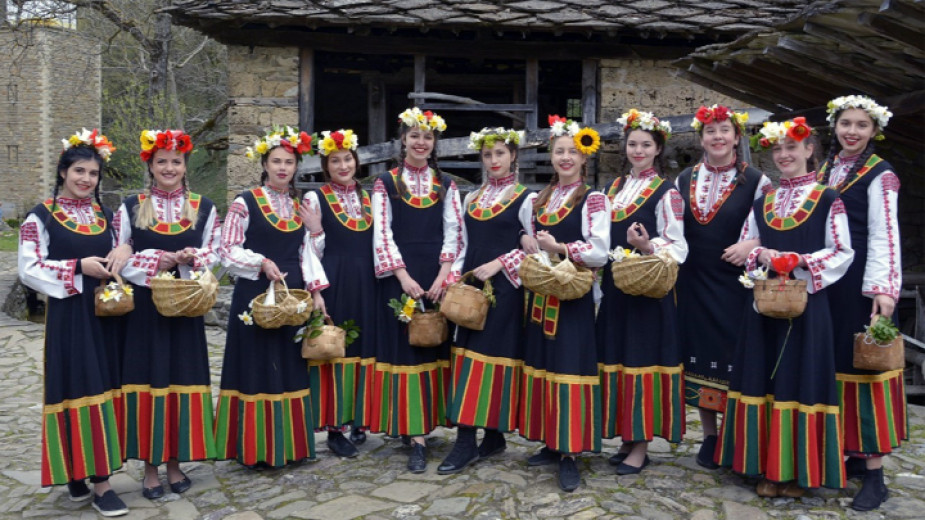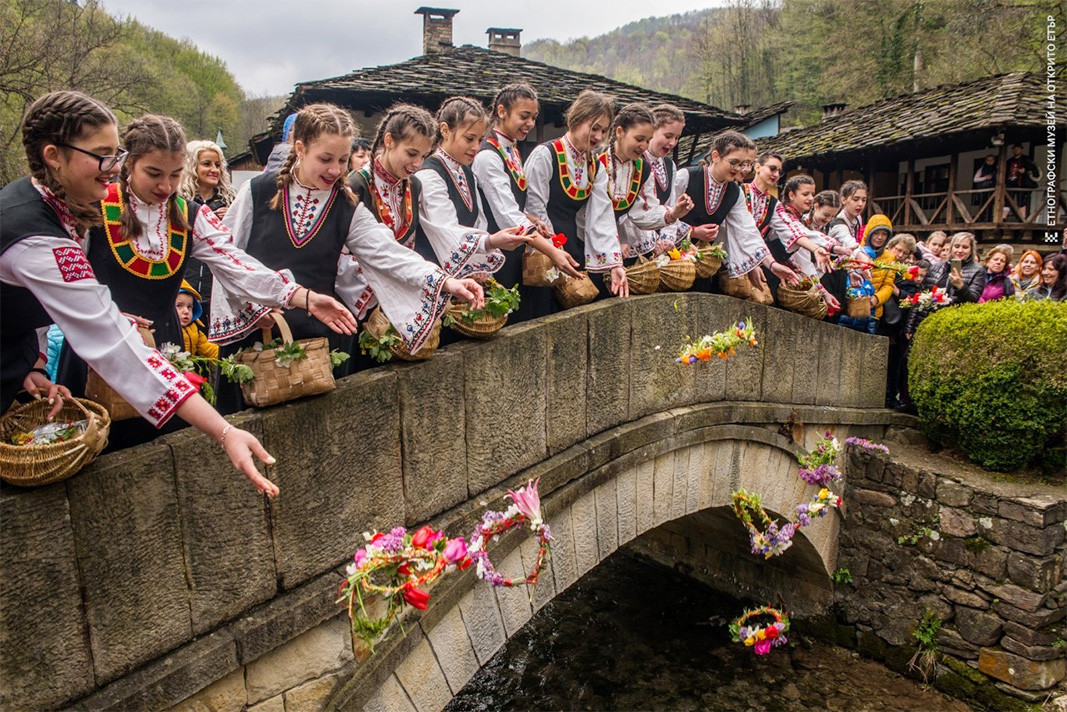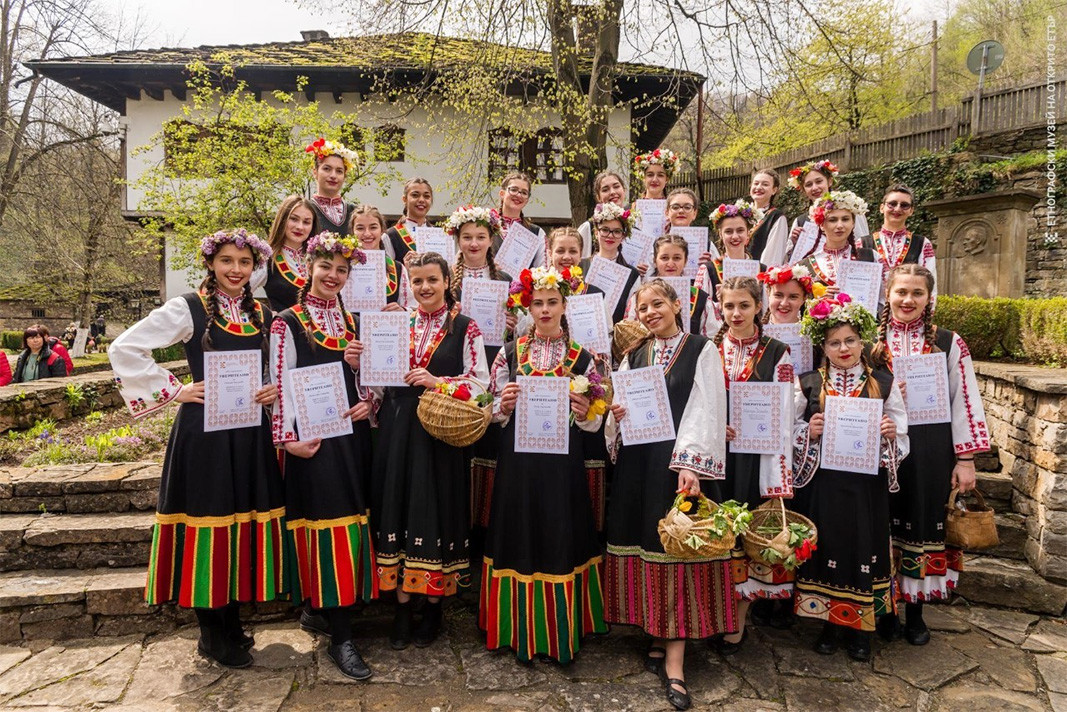 4
4
Young girls dressed in beautiful costumes from the Gabrovo region, with wreaths on their heads and baskets of flowers in their hands, will walk through the streets of the Etar Ethnographic Open-Air Museum today. The girls are participants in the only school for lazarki in Bulgaria.
The idea for the educational program was born in 2010, when the Etar Museum of Ethnology near Gabrovo, decided to revive the custom of “lazaruvane” in order to accustom children to the traditions of this holiday and present it to the general public.

"The ritual of lazaruvane is a rite of passage. After "going through" it, the girls now have the right to dress up, wear embroidered shirts and be asked for marriage”, explains Violeta Yaneva, coordinator of events at Etar Museum. "Old beliefs say that 'a girl who did not perform this ritual cannot go to gatherings and get married."
The beautiful spring holiday dedicated to love and fertility - Lazarus Day, is always marked on Saturday, the week before Easter, and the preparation for the performance of the custom begins in the middle of the Easter Lent. For three weeks the girls are introduced to the symbolism of the custom, they learn ritual songs and dances, knit wreaths with their own hands, which they will decorate for the holiday.
"We try to get as close as possible to what our ancestors did, and the goal is to introduce girls to the custom of lazaruvane so they could experience the holiday in an authentic way”, says Violeta Yaneva. “What’s characteristic for the lazaruvane songs is that there is a song for each member of the family - a girl, a boy, a bride, there are special songs when the lazarki girls visit the home of the mayor or the priest. And because there are so many songs, this long period of training is needed”.
On St. Lazarus' Day itself, the girls take part in a reenactment of the custom, which is held in the museum in front of a large audience. The girls pass through the workshops of the bazaar and bless the masters with dances and songs, which are an integral part of the holiday. The holiday has its continuation the next day - Palm Sunday, when the last element of the lazaruvane custom is performed – the so-called "kumichene".

"The girl go to the river, where they drop their wreaths made of willow twigs the day before, and the girl whose wreath came out first is chosen as a kumitsa. She is the one who will lead the lazarki girls next year. It is also believed that she will be the first to get married during the year," says Violeta Yaneva.

The first edition of "School for Lazarki” includes a dozen girls, in 2019 they are more than 30, and this year their number exceeded 50. For the first time the organizers decided to upgrade the school and include girls not only from Gabrovo, but also from the nearby towns of Dryanovo and Tryavna.
"Traditionally, lazarki were girls over 12 years of age, we accept children aged 14 to 18 and this is the main condition”, says Violeta Yaneva. “This rite of passage is when a girl crosses the border to womanhood, she says she is ready to get engaged and start a family. That is why the lazaruvane ritual performed by very little girls is uncharacteristic of the tradition. People who do not know what this rite really is feel endeared to see children dressed in traditional costumes to sing and dance, but this is not the essence of the custom”.

For the diligence shown during the holiday, the graduates of the educational programme "School for Lazarki" will receive a special certificate that they are now maidens and can marry, which, of course, has only sentimental value.
Photos are courtesy of Etar Ethnographic Museum
English version Rositsa Petkova
For the fourth year in a row, the town of Tran in Western Bulgaria will host a winter festival of masquerade games. The beginning will be set on February 3 from 12:00 to 14:00 in the central town square. Four survakari groups from Zemen, Trun and the..
On February 2, according to the Bulgarian folk calendar, it is Petlyovden (Rooster Day) - a day dedicated to the health and fertility of male offspring. It is most widely popular in Eastern Bulgaria. One of the obligatory elements is the..
Wine will spout from two drinking fountains over the weekend in Delchevo. Perched on top of the mountain, the village located close to Gotse Delchev, has made a name for itself as a tourist attraction with its ancient architecture and the beautiful..
Halva, this sweet temptation with an oriental twist, is a welcome delicacy on the Bulgarian table, especially on holidays. Judging by the descriptions of..

+359 2 9336 661
